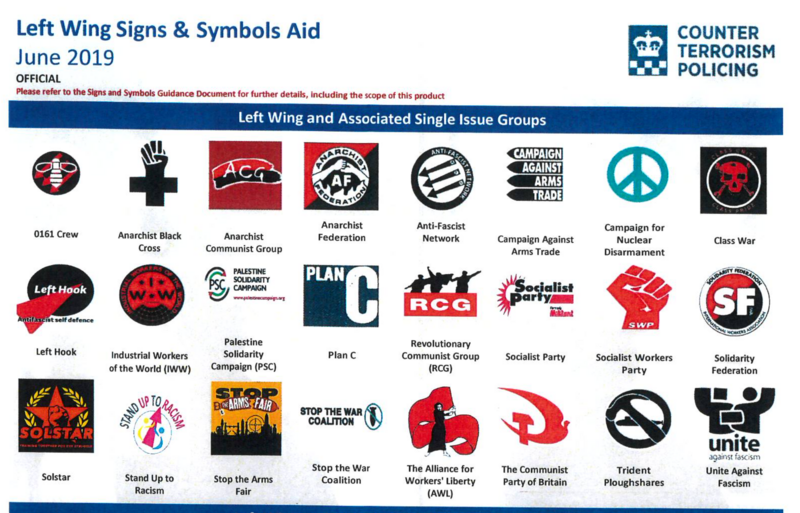Rights and Accountability 21 January 2020

Part of the police document revealed by The Guardian.
A British police “counterterror” document listed the Palestine Solidarity Campaign and a host of other peaceful groups last year alongside Nazis and other extremists.
The document, revealed by The Guardian last week, is intended to help public sector workers identify “extremist” groups.
On its final page it encourages readers to anonymously “report suspicious activity” to counterterrorism police.
The document is part of Britain’s controversial “Prevent” strategy, often criticized as Islamophobic.
“The inclusion of peaceful campaigning groups in a counterterrorism guidance document is grotesque” and a threat to basic democratic rights, the Palestine Solidarity Campaign’s director Ben Jamal told The Electronic Intifada. “The document must be immediately rescinded.”
The five-page guide begins with a “Right wing signs and symbols aid.” It shows logos of Nazi and other fascist and far-right groups.
They include some of the country’s most violent white supremacists groups, such as Combat 18, the English Defence League and even banned Nazi group National Action.
The second half of the document has a similar guide but, for “left wing and associated single issue groups.”
Police spies
These include the Palestine Solidarity Campaign, the Anti-Fascist Network, the Stop the War Coalition, the Campaign Against the Arms Trade and the Campaign for Nuclear Disarmament.
It is a who’s who of small left-wing parties and groups.
A Prevent document leaked in 2017 indicated that British police were closely monitoring “pro-Palestinian activity.”
The new document obtained by The Guardian was produced by the Counter Terrorism and Policing National Operations Centre, as shown by a note mentioning the CTPNOC. In a previous incarnation, this body ran long-term undercover police spies in peaceful campaigning groups.
A similar UK “counterterror” police unit infiltrated an undercover officer in ISM London, a Palestine solidarity group, between 2004 and 2007.
Police obfuscation
There are also several peaceful environmental groups on the list, including Greenpeace and Extinction Rebellion.
Police criticized The Guardian’s reporting of the document as “unhelpful and misleading.”
Senior “counterterror” police officer Dean Haydon said the document was only intended as a guide to various groups. He said that supporting them “does not indicate criminality” and that “much” of their activities are lawful protest.
Haydon said that membership of such groups would not necessarily “in itself trigger a Prevent [‘counter-terror’] referral.” He said that nonviolent protest was not necessarily a “potential indicator for extremism.”
But he implied that membership of legitimate protest groups could still be one factor in such referrals: “Other factors associated with vulnerability would need to present themselves.”
Repressing dissent
The Guardian reported that the document was intended to help teachers and medical staff identify “extremist” groups.
An anonymous senior teacher, who supplied the document to The Guardian, criticized it as “extraordinarily vague.” The teacher added that it “leaves a great deal down to the interpretation of the individual member of staff.”
“Clustering relatively innocuous groups like Greenpeace and [the Campaign for Nuclear Disarmament] in with genuine extremist groups seems to imply that these organizations are on the radar of the counterterrorism police and should also be interpreted as such by the teaching staff coming across them,” the teacher said.
Civil liberties group Liberty said the police were trying to “co-opt public sector workers like teachers to spy on young people in their care.”
The Campaign Against the Arms Trade called the document “another shameful attempt to repress dissent” that “further discredits the fundamentally flawed Prevent scheme,” the newspaper Morning Star reported.
“The biggest threat to democratic rights in Britain has always come from the capitalist state,” Rob Griffiths, general secretary of the Communist Party of Britain – which appears on the police list – told the paper.
“This document also urgently confirms that we need to try and bring our intelligence services under some form of genuine democratic scrutiny.”
Tags
- Palestine Solidarity Campaign
- Prevent Strategy
- Ben Jamal
- Stop the War Coalition
- Campaign Against the Arms Trade
- Campaign for Nuclear Disarmament
- Counter Terrorism and Policing National Operations Centre
- Rob Harrison (cover name)
- Greenpeace
- Extinction Rebellion
- Dean Haydon
- Liberty
- Communist Party of Britain






Comments
Democracy
Permalink Nestor Makhno replied on
The "democratic and liberal" state always was a coverup for repression and dictatorship. Nothing new, unfortunately